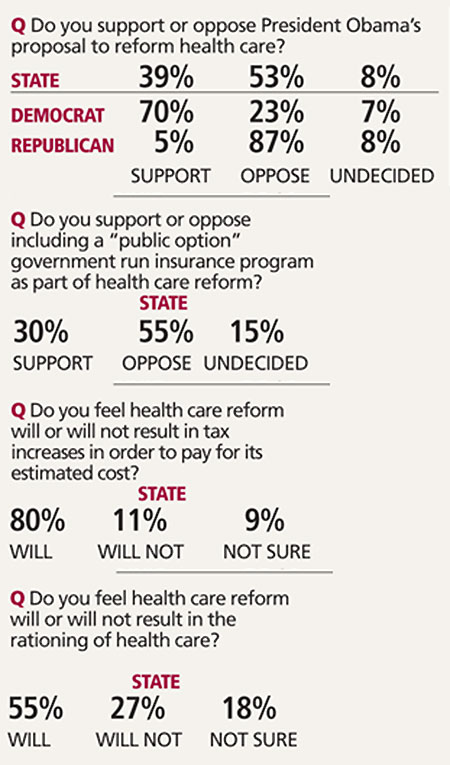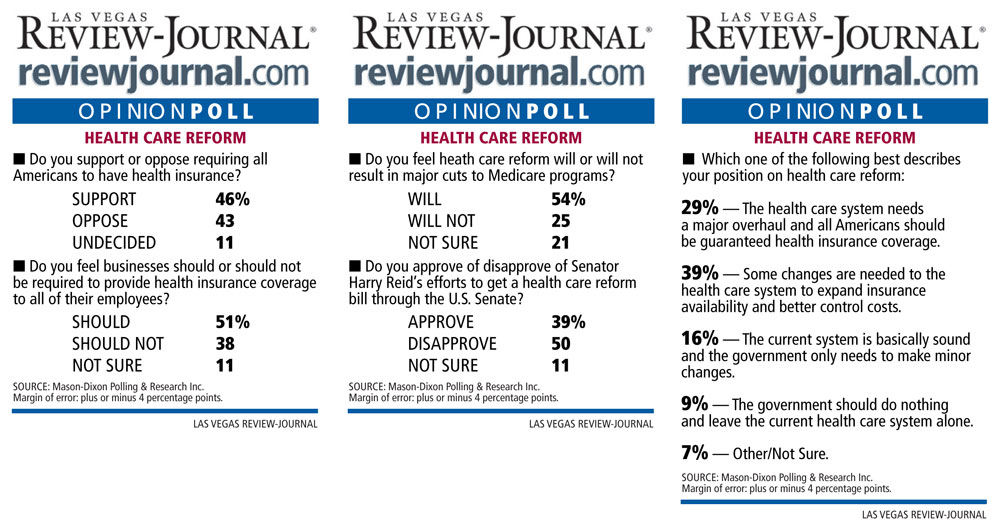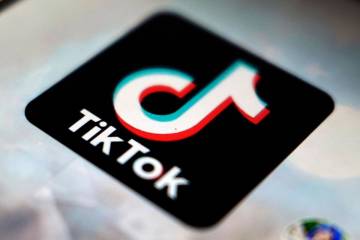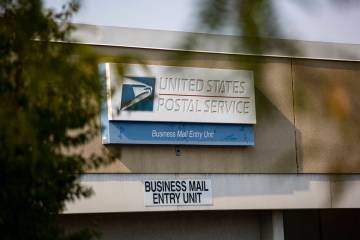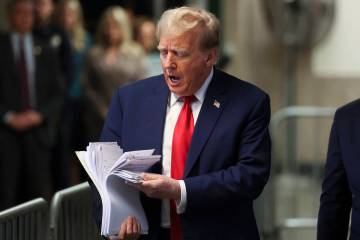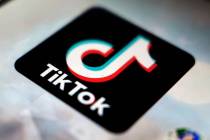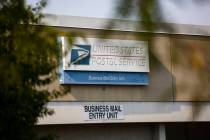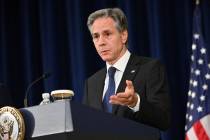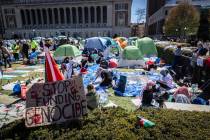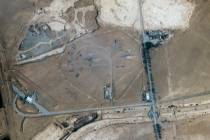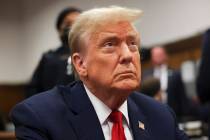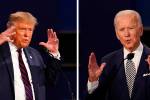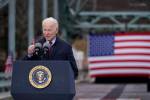Fewer back health reform
President Barack Obama has lost ground in the last month in getting Nevadans to embrace his health care reform package and, for the first time, opposition is above 50 percent and support is below 40 percent, a new poll commissioned by the Las Vegas Review-Journal reveals.
The telephone poll of 625 registered voters found that 53 percent of Nevadans oppose the president's attempt to provide a remedy for problems in the nation's health care system. Support for the plan is at 39 percent.
That's a 4 percentage point difference in both categories from an October poll that showed support at 43 percent and opposition at 49 percent, almost within that poll's margin of error. Now the gap is at 14 points and opposition in Obama's own Democratic Party is climbing, from 15 percent in October to 23 percent in the most recent poll.
But the numbers are not far off from an August poll that showed support at 40 percent and opposition at 50 percent.
Fueling discontent with the bill, the poll shows, is the growing belief by Nevadans that Obama's reform package will raise taxes, result in rationing of health care, and cause major cuts to Medicare programs.
"When you look at the entire poll, it's clear the voters of Nevada do not want this bill to pass," said Brad Coker, managing partner of Washington, D.C.-based Mason-Dixon Polling & Research Inc., which conducted the poll Monday through Wednesday. "When you break it all down, it appears that Nevadans would just as soon throw this bill out and start over."
The poll carries a margin of error of plus or minus 4 percentage points.
Coker said the poll results aren't good news for U.S. Sen. Harry Reid, D-Nev., chief architect of the Obama supported plan. Only 39 percent of the poll respondents approve of Reid's efforts to get a bill through the U.S. Senate at a time when he's running for re-election.
Though 70 percent of Democrats support Reid's efforts, Coker said that probably isn't enough to outweigh the disapproval of 53 percent of independents and 87 percent of Republicans.
"Reid is going to be front and center carrying the flag for this reform that few people like and that's not going to help him in his re-election," Coker said. "You remember what happened historically to flag bearers in war. The flag bearer gets shot first."
But Erik Herzik, a political scientist at the University of Nevada, Reno, said the poll numbers "may not be as bad as you think for Reid."
"When you add the 39 percent who approve with 11 percent who aren't sure whether they approve, you've got 50 percent," Herzik said. "And that gives him a chance."
A growing distrust of government, according to David Damore, a political scientist at the University of Nevada, Las Vegas, is reflected in the poll results.
"People are saying, 'If you can't run a Cash for Clunkers program right, how are you going to handle health care reform?'" he said. "To show you how deep the distrust of government is by Americans today, people now seem to think the government bureaucrat is worse than the insurance company bureaucrat. There is a lot of concern about the amount of debt that the government has taken on."
According to the poll, 80 percent of Nevadans, including 67 percent of Democrats, believe the reform package's estimated cost of almost $1 trillion over 10 years will require tax increases.
That mind-set exists despite continued assurances by Obama and Reid that no new taxes will be imposed on families making less than $250,000 in order to pass health reform.
When he ran for president, Obama pledged not to raise taxes on the middle class while making health insurance available to everyone.
"Nevadans seem to realize that no one has ever underestimated the cost of a government program," Coker said.
Coker said the huge government bailouts of failing banks and auto companies have had a huge effect on voters when it comes to their perception of the public option -- or government insurance program -- that would primarily help the poor.
Only 30 percent of Nevadans in the poll support the idea. Broken down by party, 53 percent of Democrats polled support the option while just 3 percent of Republicans favor it.
People hear that 30 million go without health insurance, but most Americans do have it, Herzik said. "And a lot of people don't want to have to pay for those without it."
Although fewer than half of Nevadans polled believed in October that rationing of care or Medicare program cuts would be spawned by the health reform bill, those positions have changed substantially.
In the latest poll, 55 percent of voters believe rationing will result, and 54 percent see Medicare programs being trimmed.
"What that shows more than anything is that the Democrats haven't been able to explain what their program will do," Damore said.
"We already have rationing. Millions don't have insurance, and insurance programs tell you what doctors you can go to," he said. "And even the AARP supports how Medicare is being handled in the health care reform package. There's a lot of misunderstanding out there."
Though it is apparent that Nevadans don't support the current health reform proposal, Herzik notes that the poll does show that people see problems with the current system.
"They want something done, not just the specifics being offered," he said.
Thirty-nine percent of Nevadans in the poll say some change is needed to expand insurance availability and to better control costs, and 16 percent say minor changes have to be made to a basically sound system. In other words, 55 percent see a need for some reform.
But just 29 percent of voters believe the system needs a major overhaul, one that guarantees health insurance to everyone. And 9 percent believe the system should be left alone.
In the August poll, 65 percent of respondents believed it was necessary to make "major structural changes" in the health care system to provide affordable health insurance for all Americans. But that poll did not specify what options respondents might want to see.
Regarding how their representatives voted on the House reform bill that recently passed, 52 percent of poll respondents in Democrat Shelley Berkley's 1st Congressional District approved of her "yes" vote while 43 percent disapproved. More survey takers in Democrat Dina Titus' 3rd Congressional District disapproved of her "yes" vote -- 47 percent, compared to 41 percent approval. Both districts have more Democrats registered than Republicans.
Meanwhile, voters in Republican Dean Heller's 2nd Congressional District, where Republicans hold the registration advantage, approved of his "no" vote by a wide margin, 60 percent approval to 27 percent disapproval. These questions had a margin of error of plus or minus 6 percentage points.
To Coker, Nevadans' stand on health care reform brings to mind the dilemma of what a car owner does with a troublesome 5-year-old car.
There is always the option, he said, of buying a Mercedes Benz at three times the cost, which is the way many people see Obama's health care reform package. Or you could repair what you have.
"It seems clear," he said, "that Nevadans want to repair what we have."
Contact reporter Paul Harasim at pharasim@reviewjournal.com or 702-387-2908.



